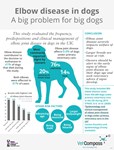Search - Research
121 - 130 of 177 results
-
New research shows that human modification of landscapes reduces mammals’ range
A new study suggests that mammals move considerably shorter distances in areas that have been modified by humans than they would if they were in the wild. Findings from an international team of leading scientists indicate that mammals move distances … -
New H2020 EU grant awarded to RVC
The Royal Veterinary College has been awarded a H2020 EU grant under the European and Developing Countries Clinical Trials Partnership Fund EDCTPF project PANDORA IDNET. This is a 10M euro project with European and African partners including …The Royal Veterinary College has been awarded a H2020 EU grant under the European and Developing …
-
Overview
The Veterinary Companion Animal Surveillance System (VetCompassTM) is an initiative focused on improving companion animal health. -
World’s largest elbow disease study helps owners of large-breed dogs
The Royal Veterinary College (RVC) has just completed the largest ever study of elbow disease in dogs attending first opinion veterinary practices in the UK. The results have highlighted which breeds are most at risk in order to assist owners to be alert for the signs of this condition and to seek veterinary treatment early. -
Ground-breaking RVC research explores prevalence of anal sac disorders in dogs
Study seeks to redress the lack of evidence-based information that has been published on the epidemiology and clinical management of non-neoplastic anal sac disorders -
New RVC study reveals consequences of 2020 pandemic restrictions on puppies
Puppy imports, designer crossbreeds and the closure of puppy classes identified as key differences in the early lives of puppies purchased in 2020 A study by the Royal Veterinary College (RVC) has revealed that puppies purchased during the … -
Largest study reveals most common disorders and lifespan of pet hamsters in the UK
New research from the Royal Veterinary College (RVC) has revealed the 20 most common disorders in pet hamsters. Of these, the most popular include “wet tail", bite injuries from other hamsters, overgrown nails and/or incisors and traumatic injury. … -
New research highlights dog breeds at most risk of hypothyroidism
A new study from the Royal Veterinary College explores the frequency and risk factors for hypothyroidism in dogs in the UK, promoting greater awareness with earlier detection and treatment New research the Royal Veterinary College (RVC) has shed … -
Bad teeth revealed as biggest problem for pet greyhounds
As well as bad teeth, the RVC research revealed that traumatic injuries, overgrown nails and osteoarthritis are also major concerns for pet greyhounds -
Study reveals the welfare impact of ear conditions in pet rabbits
Research by the Royal Veterinary College reveals that affected rabbits are less likely to display binkying behaviour and are more likely to experience a reduction in overall quality of life A recent questionnaire conducted by the Royal Veterinary …Research by the Royal Veterinary College reveals that affected rabbits are less likely to display …









